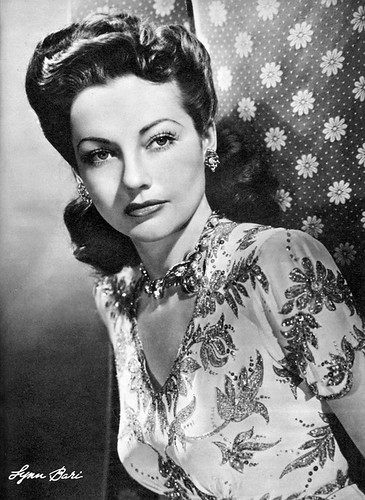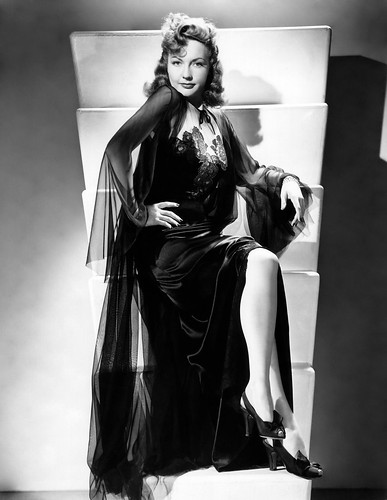Lynn Bari is one of my favorite actresses from the black-and-white era. She played a Big Band singer in three movies: "Sun Valley Serenade" in 1941, featuring the Glenn Miller Orchestra; "Orchestra Wives" in 1942, again featuring the Miller big band; and "Sweet and Low-Down" with Benny Goodman in 1944. In all three she was the prototypical, sexy, Big Band singer/temptress. She didn't sing in the movies herself, but she had the moves down oh so well.
Lynn Bari (December 18, 1913 – November 20, 1989), born Margaret Schuyler Fisher, was a movie actress (usually in B-movies) who specialized in playing sultry, statuesque man-killers in over one hundred 20th Century Fox films from the early 1930s through the 1940s.[1]
(In the hotel bar. Johnny approaches Fifi who is sitting alone at a table having a drink.)Priceless! It's the reason I love old movies.
Johnny: Sittin' up for me?
Fifi: Yeah...Momma was worried.
Johnny: Where's the Major?
F: Strolling.
(Johnny sits down with Fifi.)
F: Well, how did the romance turn out?
J: Flied out to center field.
F: Ah...you weren't yourself. What a shame. Care to tell momma about it?
J: Next Tuesday...Momma got any cash on her?
F: A little.
J: I like a girl who's solvent...Waiter! Bottle of rum! (To Fifi.) You look a little sad. You aren't homesick, are you?
F: Homesick! For where?
J: I don't know. Where you from?
F: What does it matter?
(Johnny pours a drink for himself and Fifi. She stares at him, giving him that "I like what I see and I'm available" look. He raises his glass to her.)
J: Here's to when we were young and had answers for all the questions.
F: (Dreamily) That was a nice time.
J: Yeah...Ever been up in the Wango country?
F: No.
J: They got snakes up there with great big green eyes just like yours.
F: I've done most of my crawling in warmer places.
J: I like you.
F: Snake fancier, huh?
J: No. I like you because you're everything a woman should be...a hundred and fifteen pounds of crookedness and kisses with a laugh for a finish.
F: You've got a fine sales talk, Mr. Williams.
J: Yeah. There's only one thing about a dame that's real.
F: (Leaning toward him) What's that?
J: This! (Kisses her hard)
(The two leave the lobby and head upstairs to his room. Once inside, they start getting comfortable.)
J: The principle rule is no lectures. You start that, I walk out.
F: Have it your way. (She kisses him hard. As they are kissing, he notices something in the shadows.)
J: Hold it, baby. We got a stowaway!
(Miss Haoli Young is shown lurking in the shadows.)
Young: Good evening.
J: Well! You get around a lot for a Vassar girl.
F: (Gritting teeth) Isn't this the little lady in center field?
J: Yeah, the same.
F: Outside, princess!
Y: That is for Mr. Williams to say, I think.
J: Now what is it that's on your mind, Miss Young?
Y: I want to apologize to you.
J: Is that so! For what?
Y: For letting you go.
J: (Smiles excitedly, gives Fifi a quick peck on the lips and tells her....) My duty is plain. (He turns to Miss Young and pulls her toward the door.) Come on!
F: (Angrily) True love wins, huh?
J: Yeah, something like that! (He steps through the door and into the hall with Miss Young in tow. He turns to Fifi.) Oh, give the Major my best regards, and tell him how I acted like a man of honor in a pinch!
F: (Angrily follows Johnny and Miss Young into the hall. As they flee, she growls at them.) You bore me, Mr. Williams! (She picks up the bottle of rum, hurls it at Johnny, but misses.)
J: (Tugging Miss Young as they run away) Come on, Baby! She may get the range!
 Lynn Bari's authorized biography, written by Jeff Gordon (no, not that Jeff Gordon), called "Foxy Lady," is reputed to be one of the best ever written in the genre. It's well worth the price tag.
Lynn Bari's authorized biography, written by Jeff Gordon (no, not that Jeff Gordon), called "Foxy Lady," is reputed to be one of the best ever written in the genre. It's well worth the price tag. Here's Lynn Bari as the torch singer, Vivian Dawn, in "Sun Valley Serenade." She's mouthing the words to "I Know Why." Pat Friday dubbed in the vocal. The intro is "Moonlight Serenade." By the way, that is the man himself playing his trombone, Glenn Miller, along with his band.
Here's Ray Eberle and Lynn Bari, as the wife-stealing torch singer, Jaynie, singing "At Last" fronting the Miller band in the film "Orchestra Wives." (An excellent movie, by the way!) At least Eberle is singing. Pat Friday is again dubbing the Bari vocal.
Not limiting herself to Miller, here's Bari as Pat Stirling, fronting the Benny Goodman Orchestra in the movie "Sweet and Low-Down." Yes, that is Mr. Goodman himself. Lynn's lip-sinc-ing "I'm Making Believe." This time it's Lorraine Elliot dubbing the vocal. That intro tune is Benny's theme song, "Let's Dance." And that dark-haired beauty dancing with her father is Linda Darnell.
What a glorious era! I'd give my right arm to be there now in a 40's night club listening to Benny and Bari...and dancing with Linda Darnell!
Here's Bari again with Goodman in "Sweet and Low-Down," singing "Ten Days With Baby."
Bari, again, in "Orchestra Wives," belting out "Serenade in Blue." If you don't like this, you are not breathing.
Cat fight!! Lynn stirred this mayhem up among the "Orchestra Wives." She doesn't appear in this scene, but it's fun anyway.
A couple of Lynn's other vehicles.

















No comments:
Post a Comment